Afghanistan War, Civil Liberties, Criminalizing Dissent, Human Rights, Iraq Veterans, Truth to Power, War Resister
Podcast: Play in new window | Download
Updates:
—-
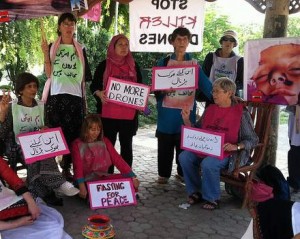
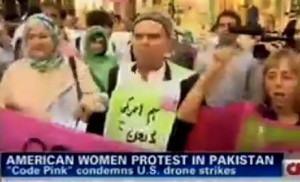
Anti-Drone Action: Code Pink Delegation to Pakistan
Two weeks ago a delegation of 40 members from Code Pink traveled to Pakistan protesting US drone strikes. The group is also visiting families of those injured or killed by drones and to encourage relations amid the broader Muslim world. The delegation is made up of students, doctors, veterans, retirees and artists. Recently the group set out on a massive anti-drone march in Waziristan where drones have killed many civilians. In one statistic, within two years more than 90 drone attacks have killed 5000 innocent Pakistanis. We get an update on the delegation from Code Pink member Rae Abileah. Rae is the co-director of CODEPINK Women for Peace. She is also a founding member of Young Jewish Proud, the youth wing of Jewish Voice for Peace. Rae has visited Israel and the West Bank several times, and has traveled to Gaza and Iran.
Rae Abileah:
- I’m the co-director of Code Pink nationally. Medea Benjamin, co-founder of Code Pink has been doing work on drones for the past year and a half. She recently wrote a book Drone Warfare: Killing By Remote Control
- She partnered with PTI, the Pakistani Political Party and their leader and a well known lawyer for drone victims.
- They got this delegation rolling and ended up with 35 Americans in Islamabad setting out on this caravan to march to a place where really in the past decade no Americans have gone to.
- They put their bodies on the line and joined these Pakistanis going on this march.
- People in Waziristan are living with drones overhead, they don’t know when the next attack is going to come.
- It started out as a car caravan with more than 100 vehicles, they drove for hours.
- The goal was to get to south Waziristan the epicenter of the US drone attacks.
- President Obama has declared all young men in Pakistan to be potential militants. It gives the green light to shooting civilians.
- These soldiers are sitting there all day looking at the screen as if its a video game.
- These military pilots are going to work all day, pressing buttons that kill people thousands of miles away and going home to their dinner table in Vegas at night.
- It’s a primary tool for attracting militants to join the Taliban.
- We’re continuing to build grassroots support to oppose Obama’s drone program.
- During the delegation we were actually able to deliver thousands of signatures collected on a stop drones petition directly to Obama at one of his fundraisers in San Francisco.
- In Congress there’s also a Drones Caucaus, the leaders such as Bill Buck McKeon are taking hundreds of thousands of dollars from drone manufacturers.
- Soda Stream is manufactured in an illegal settlement in the occupied territories.
Guest – Rae Abileah, co-director of CODEPINK Women for Peace and is a co-organizer of Occupy AIPAC, Stolen Beauty boycott of Ahava cosmetics, and Women Occupy. Rae is a contributing author to 10 Excellent Reasons Not to Join the Military; Sisters Singing: Incantations, Blessings, Chants, Prayers, Art and Sacred Stories by Women; Beyond Tribal Loyalties: Stories of Jewish Peace Activists; and Beautiful Trouble: A Toolbox for Revolution. She lives in San Francisco, CA.
——

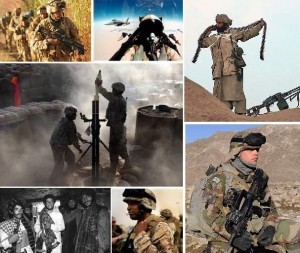
11 Years of War In Afghanistan
This month marks 11 years since the colonial war in Afghanistan was launched. Operation Enduring Freedom armed forces include the United States, the UK, Australia and the Afghan United Front. We’ve talked with past guests about how multi-national corporations are involved to integrate Afghanistan into the global system by building schools and infrastructure. We’ve also talked about the strategic energy alliances forming between Russia and China on one side and how three Caspian Sea oil companies continue to lock the US in to the war.
Phyllis Bennis:
- This already the longest war in history.
- We hear from President Obama that within the year 2014 combat troops will be withdrawn.
- We’re hearing new calls from different forces including most recently the Secretary General of NATO indicating there was a possibility that NATO may pull out its troops earlier then the end of 2014 because of the insider killings.
- The only figures we have began in 2007, they began counting some confirmed deaths. About 13 thousand Afghan civilians only since 2007.
- The US is there in two ways, the US has a commander happens to be the NATO commander. Other US troops are there separately. The US has almost 70 thousand troops there now, NATO has 40 thousand other troops and there are about 90 thousand US paid contractors.
- US troop casualties: Even that now is unclear.
- Last week a number of press outlets reported the 2000th US military casualty.
- Young people in Afghanistan join the military for the same reasons young people in the United States join the military, because they’re desperate for a job.
- Remember a couple of weeks ago 9 Afghan women and little girls were killed gathering wood before dawn to build a fire, to make breakfast.
- The Pentagon said, oh sorry, and somehow think that its going to make it ok.
- Add to that the lack of cultural sensitivity, the lack of language training so there’s no sense from soldiers on the ground that they have any idea what this culture is about, who these people are.
- Afghanistan is about 25 million people, the vast majority don’t live in the cities. They live in tiny hamlets and small towns, small villages, very scattered.
- What we’re seeing is an expansion of the global war on terror.
- There is an anti-war movement it’s just not as visible as we’ve seen in earlier times.
- That’s the hardest part of our work, its not building an anti-war movement, its making our government take into account the opinions of not only a movement but the American people.
- Understanding the Palestinian Israeli Conflict.
Guest – Phyllis Bennis, director of the New Internationalism Project at the Institute For Policy Studies. She is also a fellow of the Transnational Institute in Amsterdam. She has been a writer, analyst, and activist on Middle East and UN issues for many years. In 2001 she helped found and remains on the steering committee of the U.S. Campaign to End Israeli Occupation. She works closely with the United for Peace and Justice anti-war coalition, co-chairs the UN-based International Coordinating Network on Palestine, and since 2002 has played an active role in the growing global peace movement. She continues to serve as an adviser to several top UN officials on Middle East and UN democratization issues.
———————————————————————-
Afghanistan War, Civil Liberties, Criminalizing Dissent, FBI Intrusion, Habeas Corpus, Human Rights, Iraq Veterans, Iraq War, Surveillance, Torture, War Resister
Podcast: Play in new window | Download
Updates:
————————–
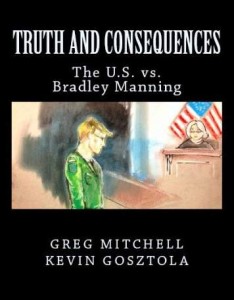
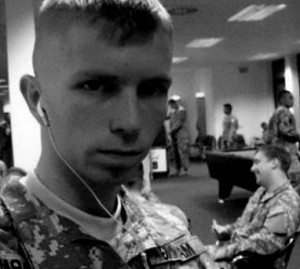
Truth and Consequences: The U.S. vs. Bradley Manning
In the past year, we’ve covered Wikileaks and specifically the Bradley Manning case in our updates. We talk today with Greg Mitchell co-author of the new published book, Truth and Consequences: The U.S. vs. Bradley Manning. In the first part of the book titled Solitary Man, Greg Mitchell gives readers a detailed look into the character of Bradley Manning. The second part of the book details the Bradley Manning trials written by co-author Kevin Gosztola. Hard journalism let the voices of friends and family document the important details in Manning’s life leading up to Wikileaks and then the book dives into the complexities of the trial. In the preface Greg writes “Ultimate truths, in this case, may lead to ultimate consequences for one who would not be silent.
Greg Mitchell:
- The second half of the book is really the only thing out there that covers in depth what has happened to him in the last few months.
- Namely his court martial proceedings after he was imprisoned for a year and a half. His first hearing was last December. He is awaiting what is expected to come out as a formal court martial in August. If it does start in August, it will be well over 2 years since he was arrested.
- A lot of the charges are related to passing along to Wikileaks, this classified secret information. Course the most dynamite charge is that he gave aid to the enemy.
- Who is the enemy? The government was forced to say that it was Al-Qaeda. That charge potentially carries the death sentence.
- They’re interested in punishing Manning, the big fish they’re after is Julian Assange.
- Last year there was global outrage when he was kept in solitary confinement, being forced to sleep naked, and stand at attention naked.
- All the top media outlets had a falling out with Wikileaks, and I think there’s a spill over from that.
- There hasn’t been any media coverage that really probes into what’s going on here.
- Over and over he (Bradley Manning) cited his outrage at what he was seeing in those cables and in Iraq, and things he was asked to participate in.
- The court martial will be extremely embarrassing to the military because they gave him access to these documents.
- He was a kid who grew up in Oklahoma, his parents eventually got divorced. He was a computer nerd, growing up. He realized in his teens, he was gay.
- He wasn’t a longtime peacenik or things like that, he always had some social conscience, and when he got to Iraq, he saw things that upset him.
- It may have never come out, that he would be arrested, except that he had these online chats with Adrien Lamo, who is a convicted hacker. Lamo decided Manning was talking too much about what he did and went to the authorities.
- The Manning case shows this incredible legacy of our wars in Iraq and Afghanistan, which have gone on for a decade, its never ending and yet the American public has never been brought face to face with what the US has done in those countries, civilian casualties.
Guest – Greg Mitchell writes daily for The Nation magazine’s web site. He is the author of more than a dozen books, including The Campaign of the Century (winner of the Goldsmith Book Prize), So Wrong for So Long: How the Press, the Pundits and the President Failed on Iraq, Why Obama Won, Tricky Dick and the Pink Lady, The Age of WikiLeaks, and with Robert Jay Lifton, Hiroshima in America and Who Owns Death? His most recent books are Atomic Cover-up and Journeys With Beethoven. He was the editor of Editor & Publisher from 2002 to 2009. He also served as longtime editor of Nuclear Times magazine, and before that was senior editor at the legendary Crawdaddy. Hundreds of his articles have appeared in leading publications and he has served as chief adviser for two award-winning documentaries.
—-

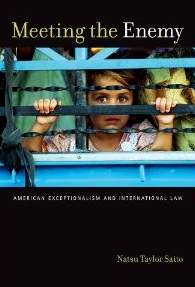
Lawyers You’ll Like – Attorney Natsu Saito
For our Lawyers You’ll Like series, we welcome back attorney and professor Natsu Saito. In our last interview, Professor Saito mentioned how the current system of international law evolved from the a broader agreement between the European colonial powers based on how they were not going to destroy each other in the process of taking over the rest of the world. It is this duality that Natsu writes about in her book Meeting the Enemy: American Exceptionalism and International Law. Professor Saito joined the College of Law faculty in 1994 and teaches international law, human rights, race and the law, immigration, criminal procedure, and professional responsibility. Her scholarship focuses on the legal history of race in the United States, the plenary power doctrine as applied to immigrants, American Indians, and U.S. territorial possessions, and the human rights implications of U.S. governmental policies, particularly with regard to the suppression of political dissent.
Professor Natsu Saito:
- The duality that the US does exempt itself (from international law) very consistently and very frequently and yet promotes international law very strongly and relies upon it.
- It has relied upon certain premises that are fundamental to the whole outlook and paradigm of colonialism – which is that there is a higher good, a more civilized approach the US embodies.
- The law doesn’t apply because we have a higher aim of civilization and that justifies not playing by the rules.
- The United States making others comply with human rights standards while exempting itself
- Moving humanity toward this higher goal is so critical because if you strip that away and you look at the realities on the ground, you see what has been termed Western civilization has been incredibly barbaric.
- In order to get around that analysis, you have to say it was for a higher good.
- I think the “left” tends to accept the general framework, and to make particular criticisms of policies and practices that are obviously problematic. The US government engaging in torture for example, but each instant is accepted as anomalous instead of the larger picture.
- It is too frightening even for the people on the left to deal with the reality that this is a country that sits on occupied land, illegally occupied by its own rules. People on the left want to make it a kinder, gentler colonialism.
- I started out thinking I was writing a book about the failure of the United States failure to comply with international law, as I got into it, the more interesting questions were the push / pull dynamics between reliance on international law
- The current system of international law evolved from the international law which was the agreement between the European colonial powers of how they were not going to destroy each other in the process of taking over the rest of the world.
Guest – Professor Natsu Saito, Department of Ethnic Studies, University of Colorado. Co-Sponsors: UCI Department of Asian American Studies; UCI Department of Planning, Policy, and Design; UCI Department of Criminology, Law and Society; The Center for Unconventional Security Affairs; The Center for Research on Latinos in a Global Society. Legal scholar Dr. Natsu Saito delivered a lecture on homeland security. Her lecture examined the implications of the USA Patriot Act on Civil liberties for immigrant groups and for the rest of the population
——————————————-
Afghanistan War, Civil Liberties, Criminalizing Dissent, FBI Intrusion, Green Scare, Guantanamo, Habeas Corpus, Human Rights, Iraq Veterans, Iraq War, Political Prisoner, Surveillance, Targeting Muslims, Torture, Truth to Power, War Resister
Podcast: Play in new window | Download
Updates:
—

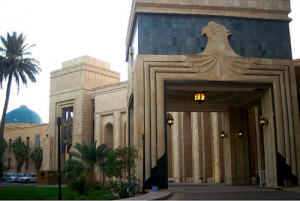
The State of Perpetual War
Since September 11, 2001 the US global war on terror has reached beyond Afghanistan and Iraq. The US constructed the largest embassy ever in Baghdad to control the resources of Iraq. Meanwhile strikes against Pakistan, Yemen, and Somalia, led an air war against Libya without any Congressional authorization continue as pointed out by author Anthony Arnove. In his article titled The 10th Anniversary of 9/11 Arnove describes US foreign policy of preventive war and how the US continues to use drone strikes against Pakistan, Yemen and Somalia. Now other countries are adopting the preventive war idea to fight (quote) terrorism. Today, the Obama Adminstration has gone beyond the Bush policies as trillions are spent on perpetual war while schools, health care and social needs crumble.
Anthony Arnove:
- 911 was seized upon by the Bush Administration as an opportunity. Condoleezza Rice specifically used the word opportunity to describe the geo-political shifts that she saw occurring in the wake of 9-11.
- We’ve seen the invasion of Iraq, the invasion of Afghanistan, covert operations and Arab bombardment of dozens of countries. There’s an estimate now that this year the US will be operating in 120 countries in some capacity through use of commandos.
- You’ve seen increased troop levels in Afghanistan so that even with the current so called draw down of the troops in Afghanistan, even with the reductions that are currently being undertaken, we’re still going to be ahead of the number of troops that were in Afghanistan at the end of the Bush Administration.
- Withdrawal, the word no longer has any meaning. It actually means slight reduction of troops after they’ve been increased.
- There are 46 thousand active duty troops in Iraq. The claim is that those 46 thousand will leave at the end of 2011 after an agreement reached under pressure from social movements in Iraq.
- Then you look at the military installations that scatter the country, they’re not going to walk away from that easily.
- In Afghanistan, they’re literally talking about dates as far as 2024 in terms of troops on the ground involved in a number of capacities.
- I think Libya is truly an opportunistic action by the United States concerned its losing control in the middle east. You’ve had uprisings and revolutions that have toppled governments aligned with the United States.
- The US has been so contemptuous of the freedoms of people around the world. So contemptuous of democracy, so contemptuous of people fighting for self determination.
- So contemptuous of nationalist movements that would have put resources into the control of the people.
- The actions of the Bush Administration and now Obama have only made us more hated, and made the world more dangerous.
- They claim they’re making the world more safe, and protecting us. The reality is the opposite.
- At least Barack Obama will be more responsive to social movements, we’ll be able to pressure him. It is clear that is not the case, there has been a demobilizing of sections of the anti-war movement who define the political horizons as the debate between the Republicans and Democrats.
- The anti-war movement has been silenced.
- The people who most vociferously supported invading Iraq, claimed there would be weapons of mass destruction, all of those things we now know to be lies, those people are regularly asked to be commentators on Iraq and Afghanistan.
- Yet the people who got it right, saying this is what will happen if we invade, those people are never heard from.
- The gap between what the elite are doing and what they are saying, and what is in their interest and the interest of ordinary people has never been wider.
- On October 6, 2011, a number organizations have called for demonstrations in Washington DC and solidarity actions in other cities. On October 15 actions have been called for by the United National Anti-War Coalition. NationalPeaceConference.org
Guest – Editor and writer Anthony Arnove. He is best known for his books on Iraq and the Iraq War. Arnove is the author of the book Iraq: The Logic of Withdrawal, published in hardcover by the New Press and in paperback by Haymarket Books. Arnove toured the country promoting the book in spring 2006 as part of the New Press’ “End the War Tour”.
Arnove is also the editor of Iraq Under Siege, published by South End Press, the co-editor with Howard Zinn of Voices of a People’s History of the United States, published by Seven Stories Press, and the editor of The Essential Noam Chomsky, published by the New Press. He writes frequently for left-wing publications; he is a featured author at ZNet, a columnist for Socialist Worker, and on the editorial board of the International Socialist Review.
—
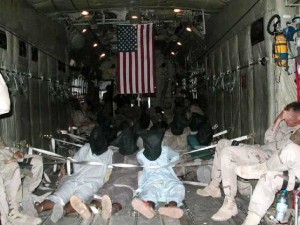
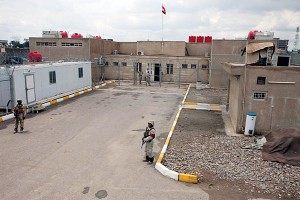
The Guantanamo Syndrome
Attorney Michael Ratner:
- Pinochet’s Operation Condor was to round up opponents all over the world to torture and imprison them. This is now an American Operation Condor.
- AUMF and Military Order #1 allow the administration to use drones around the world. This is the key piece of legislation. Out of the AUMF came military order # 1, November 13, 2001. The president can arrest anybody, they can be kept anywhere, American citizen or not.
- From there flows the Guantanamo Syndrome. Habeas Corpus, a person who’s the prisoner of the executive can go to court and say put the executive on the defensive. Why am I being held? You have to have a legal basis.
- After many years of litigation representing this incommunicado people at Guantanamo, we ended up representing their parents or relatives, because we couldn’t represent them, the Supreme Court finally said, it’s a Constitutional right to go to court to test your detention. They said that about the people in Guantanamo in particular, they didn’t say that about the people in Baghram or other places.
- Once we won that right, the Bush Administration and the Obama Administration went into court and completely opposed that right having any meaning. It is really an unrecognizable world from what we had ten years ago.
—-
Audio Collage
- Surveillance State: The 51st State
- Targeting Muslims Since 9-11
——————————————————————
Afghanistan War, CIA Sponsored Terror, Criminalizing Dissent, Human Rights, Iraq Veterans, Iraq War, Targeting Muslims, Torture, Truth to Power, War Resister
Podcast: Play in new window | Download
WBAI Listeners Please Click Here For This Week’s Rundown
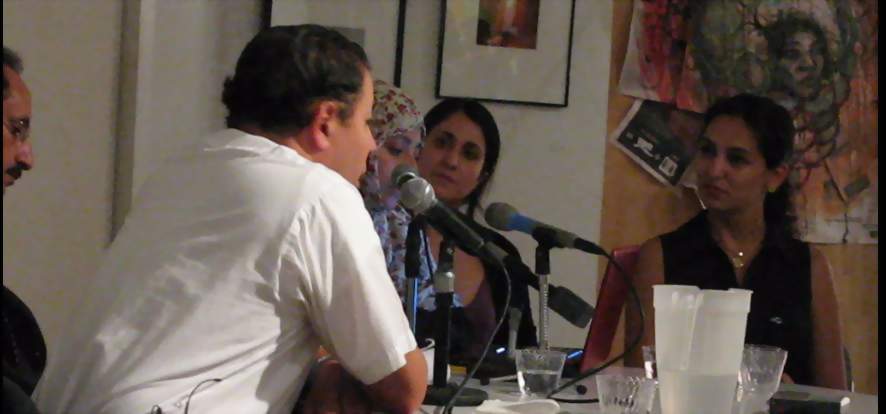

The United States and Yemen: Destroying Lives in the Name of National Security
We hear the voices of leading Yemeni activists and a Center For Constitutional Rights attorney speak on state violence, targeted killings, and human rights abuses enabled by the so-called “War on Terror” from the Brecht Forum event titled The United States and Yemen: Destroying Lives in the Name of National Security. The event was co-sponsored by the International Federation for Human Rights and the Brecht Forum. We hear first from Pardiss Kebriaei staff attorney at the Center for Constitutional Rights. Pardiss is working on a lawsuit to challenge a U.S. government kill-list and the targeting of a U.S. citizen now in Yemen and far from any armed conflict with the United States.
We hear from Tawakkol Karman chairwoman of the Yemeni non-government organization Women Journalists Without Chains, which campaigns for freedom of the press in Yemen and against human rights violations. She is a very prominent young activist, and Reporters Without Borders chose her in 2009 as one of the top seven women who have led change in the world. Karman is among the activists who in 2007 launched the “Phase of Protests and Sit-ins” in Yemen, holding regular sit-ins in the capital’s Freedom Square to demand democratic reforms and an end to human rights violations—including the harassment and imprisonment of journalists and dissidents, closure of critical newspapers, and censorship of news articles. A special thanks to Leili Kashani Education and Outreach Associate for the Guantánamo Global Justice Initiative at the Center for Constitutional Rights.
Also on the panel, to be heard soon, Ezz-Adeen Al-Asbahi, president of Human Rights Information & Training Center (HRITC), a non-governmental organization which seeks to enhance human rights in Yemen and the Arab World, focusing on the Gulf States in particular. HRITC has consultative status with the United Nations, offers training courses and forums on human rights, publishes a quarterly human rights magazine called Our Rights, and has published 30 books on law and human rights. Al-Asbahi is also the coordinator of a large regional network of human rights activists in the Gulf States and the Peninsula, and the president of a Yemeni network of human rights organizations which includes six Yemeni NGOs. A journalist and researcher, he has published eight books on literature and human rights. He is also the head of the civil society sector of the Supreme National Authority to Combat Corruption.
—-

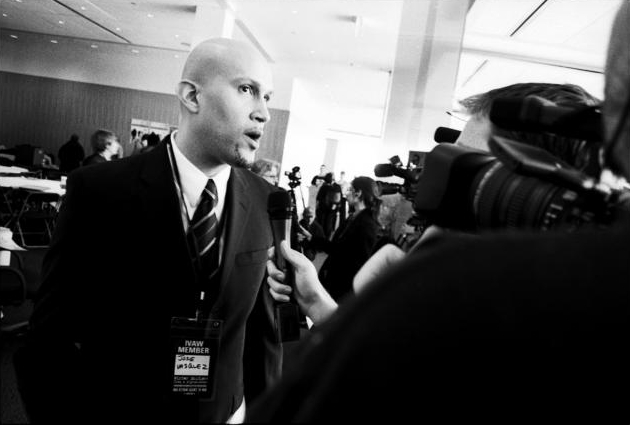
Troops out of Iraq, Permanent Bases and Privatizing the Occupation.
While many reports claim most US troops are leaving Iraq, there will still be 50 thousand troops remaining, 4 thousand will be replaced by 7 thousand security contractors. These are armed private contractors, former military with specialized skills in weaponry, radar and explosives. They will have less accountability in war zones. Meanwhile, massive permanent US bases remain including the world’s largest US Embassy in Bagdhad, Iraq. As the occupation in Iraq is privatized, veterans return back to the US. We’re joined today by conscientious objecter and Executive Director of Iraq Veterans Against the War, Jose Vasquez. Jose joined IVAW in June 2005 and co-founded the NYC chapter serving as the president. He also served on the interim board of directors and was elected to the first official board in 2006. He helped organize numerous actions and events including the Veterans’ and Survivors’ March to New Orleans, Operation First Casualty in NYC, and Winter Soldier: Iraq and Afghanistan.
Jose Vasquez:
- IVAW is a membership based organization, we are all folks who’ve served since September 11th.
- We call for the immediate withdrawal of all occupying forces from Iraq. We also have the same resolution for Afghanistan. We also want reparations for the Iraqis and full benefits for returning service members.
- I signed up right out of high school, graduated in ’92. I went straight in to active duty, I served 4 years as a Calvary Scout. Got out went to school and the Army Reserves as a medic.
- I had been in the military for a while before September 11th. I had a pretty good understanding of what our relationship was to Iraq. It was confusing to me, I was facing deployment. I stumbled across Democracy Now and I just started listening to that show religiously.
- By 2004, I was so upset about the Iraq War, I didn’t care what happened, I was not going to this.
- I started researching conscientious objection, six months later I filed for CO status. It took 27 months to get an answer.
- The Obama Administration has a finger on the pulse in terms of marketing hope. What they’re skimming over is how contractors are on the ground (in Iraq)
- From the perspective of an Iraqi, Americans running around with guns has not diminished that much.
- I think we owe the people of Iraq a lot. This mostly has to do with the US positioning itself to access the resources that they have.
- Stop the deployment of PTSD troops
Guest – Jose Vasquez, Jose was born in Bronx, NY and grew up in Southern California from the age of nine. After graduating high school in 1992, he enlisted in the U.S. Army serving over four years of active duty as a cavalry scout assigned to the 2nd Battalion, 69th Armor Regiment, 24th Infantry Division at Fort Benning, GA, and the 3rd Squadron, 4th Cavalry Regiment, 25th Infantry Division at Schofield Barracks, HI. He was honorably discharged in December 1996 at the rank of specialist (E-4).
Afghanistan War, Civil Liberties, Criminalizing Dissent, Guantanamo, Human Rights, Iraq Veterans, Iraq War, Torture, Truth to Power, War Resister
Podcast: Play in new window | Download
Updates:
—–
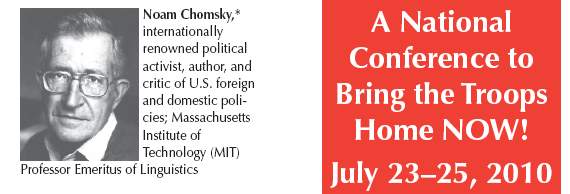
C0-host Michael Smith talks with attorney Jim Lafferty about the upcoming anti-war conference in Albany, New York, July 23-25. Noam Chomsky, internationally renowned political activist, author, and critic of U.S. foreign and domestic policies; Massachusetts Institute of Technology (MIT) Professor Emeritus of Linguistics is the keynote speaker. Click here for flyer (PDF) Groups sponsoring the event: After Downing Street, Arab American Union Members Council, Bail Out the People Movement, Black Agenda Report, Campus Antiwar Network, Campaign for Peace and Democracy, Citizen Soldier, Code Pink, Grandmothers Against the War, Granny Peace Brigade, International Action Center, Iraq Veterans Against the War, Military Families Speak Out, May 1st Workers and Immigrant Rights Coalition, National Assembly to End the Iraq and Afghanistan Wars and Occupations, National Lawyers Guild, Office of the Americas, Peace Action, Peace of the Action, Progressive Democrats of America, Project Salam, September Eleventh Families for Peaceful Tomorrows, The Fellowship of Reconciliation, U.S. Labor Against the War, Veterans for Peace, Voices for Creative Nonviolence, Voters for Peace,Women’s International League for Peace and Freedom, The World Can’t Wait.
—

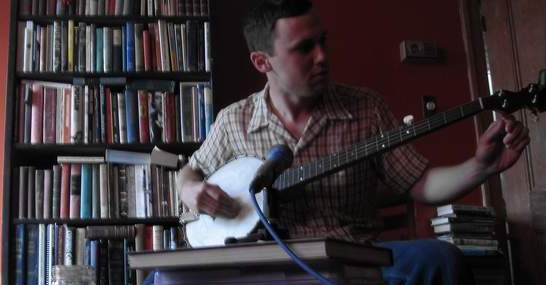
Iraq War Veteran, Conscientious Objector and Musician Clifton Hicks
Clifton Hicks is an activist with the Iraqi Veterans Against the War. Hicks is disabled and enrolled as an Anthropology student at Appalachian State University in Boone, North Carolina. Appalachian State is a center for old-time music, and Hicks is also an accomplished musician and banjo player. Cliff Hicks is psychologically disabled and got out of the Army as a conscientious objector several years ago. In the Spring issue of The Veteran, published by Vietnam Veterans Against the War, there’s printed the following chant, that is repeated by soldiers in training to go to Iraq. “I went down to the market where all the people shop, I pulled out my machete, and I began to chop, I went down to the park where all the children play, I took out my machine gun and I began to spray.” This is the kind of psychological brutalization that our young men are forced to endure that turn them into creatures they never thought they’d become.
Clifton Hicks:
- I was in 9th grade when 9/11 happened. I called the recruiter when I was 16, to try and get in.
- I saw Muslim and Arabic people and thought they were all out to get us.
- I listened to a lot of daytime AM right-wing radio. I had the ole cliche patriotic notions going.
- I wanted to go combat arms from the start, I figured if I was going into the Army, I wanted to fight.
- My feet were on the ground in Iraq in October 2003. The guys I was with that had already been there for a while had gotten pretty nasty. Guys get nasty, because their friends get killed and you realized you can’t trust anybody.
- We were the first division in combat to be out there for more than 13 months.
- They would literally give us candy and toys to give out to Iraqi kids at schools, the next day you’re ridin’ around and you see a b unch of kids get shot.
- I became an anti-war activist while I was still in the Army. We started an IVAW chapter in Gainesville Florida
Guest – Clifton Hicks, Branch of service: United States Army (USA) / Unit: C Troop, 1st Squadron, 1st U.S. Cavalry Regiment / Rank: PFC / Home: North Carolina / Served in: Ft. Knox, OIF 1, Germany. Hicks a musician and is currently a student at Appalachian State University in Boone, North Carolina.
——————————————————————–
Afghanistan War, Civil Liberties, Gaza, Human Rights, Iraq Veterans, Iraq War, Targeting Muslims, Torture, Truth to Power
Podcast: Play in new window | Download
Updates:
—
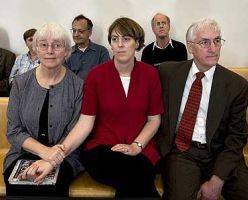
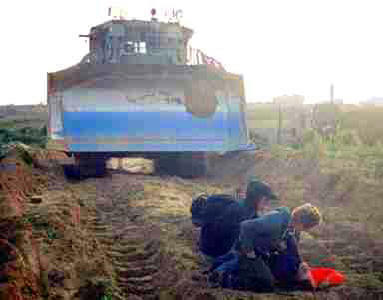
Rachel Corrie wrongful death v Israel
This month, the Haifa District Court in Israel will begin hearing eyewitness testimonies in a civil lawsuit filed in 2005 by Rachel Corrie’s family against the State of Israel for her unlawful killing in Rafah, Gaza. On March 16, 2003, Rachel was crushed to death by a Caterpillar D9R bulldozer while trying to protect the home of a Palestinian doctor from demolition. She was run over and killed by an IDF soldier who was operating the bulldozer. Seven years later, Rachel’s parents are still seeking the truth. The trial is expected to show the circumstances of her death and hold the Israeli military reponsible. Four eyewitnesses to Rachel’s killing have been recently granted visas by Israel to testify but Israel is refusing to allow the Palestinian doctor who treated Rachel and confirmed her death into Israel.
Maria LaHood:
- CCR represented Rachel Corrie in the United States because she was run over by a Caterpillar bulldozer. The same month in 2005, the Corries brought a suit against Israel, in Israel for the killing.
- This suit was on the advice of the US State Department. You can sue Israel, the country. Israel claims immunity.
- Israel’s defense that the bulldozer driver couldn’t see Rachel Corrie in the bright orange jacket.
- Expert witness says Israel’s heavy machinery operator policy says do not use around people.
- Rachel was defending the home and the bulldozer crushed her. Rachel was with the International Solidarity Movement. The Corrie family will present their evidence to the Israeli court and then there’s a 30 day break in the trial. This is not a jury trial, it is before a judge. Corries are asking for information, and accountability.
- In the attacks of Gaza a year ago, more than 4000 houses were demolished.
- Someone was filming at the border at the time of Rachel’s death, the actual part of the tape where she was crushed is missing.
- Mamilla Cemetery Case Update: We’ve asked the special rapporteurs of the United Nations to intervene.
- Michael Ratner: It does seem to be intentionally provocative. To be doing this on a cemetery and calling it the “Center for Tolerance” MamillaCampaign website.
Guest – Staff attorney Maria LaHood. Maria specializes in international human rights litigation, seeking to hold government officials and corporations accountable for torture, extrajudicial killings, and war crimes abroad. Her cases include Arar v. Ashcroft, against U.S. officials for sending Canadian citizen Maher Arar to Syria where he was tortured and detained for a year; Matar v. Dichter, against an Israeli official responsible for a “targeted assassination” that killed 15 Palestinians; Belhas v. Ya’alon, against a former Israeli official responsible for the 1996 shelling of a United Nations compound in Qana, Lebanon, that killed over 100 civilians; Corrie v. Caterpillar, on behalf of Palestinians killed and injured in home demolitions, and Rachel Corrie, a U.S. human rights defender who was killed trying to protect a home from being demolished.
———–
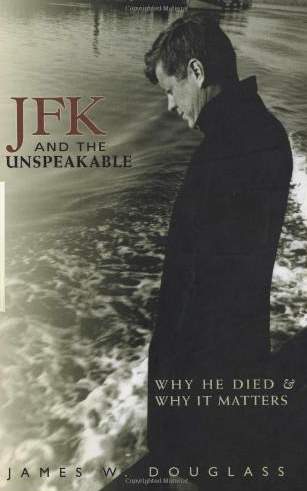
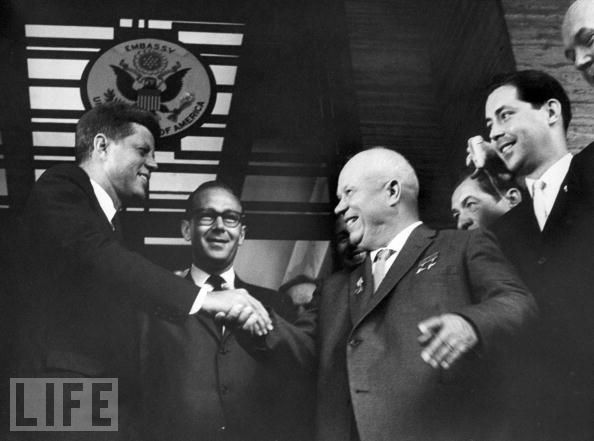
JFK and the Unspeakable: Why He Died and Why It Matters by Jim Douglass
JFK, The Unspeakable, is the first book of 3 on the assassinations of the 1960s. Orbis Books has commissioned author James W. Douglass to write about the murders of JFK, Malcolm X and Martin Luther King, and his the third will be on the assassination of Bobby Kennedy. The heart of JFK the Unthinkable, is not how Kennedy was killed or how Kennedy became a threat to the systemic war machine, but why DID Kennedy die? Author James Douglass says Kennedy knew that he would die and had the guts to stand up to the system and take the hit. This narrative was lost for decades, obscured by disinformation about Kennedy’s character and the conspiracy of his assassination. One review summarizes Douglass’s book in this way : JFK’s belated effort to turn America from an armed culture of victory to a member of an international peaceful world was shot down in Texas for a reason.
Jim Douglass:
- John F. Kennedy’s experience in WWII: He was in the South Pacific, he volunteered. He was on that PT boat.
- What happened on that PT boat, is that it got split into two by a Japanese destroyer. He lost brothers and friends at that time. An extraordinary experience being adrift on the ocean warning other PT boats. The experience create a distrust in military authority.
- He said that he wanted to splinter the CIA into a thousand pieces and scatter to the winds.
- As Kennedy said to his friends, “they figured me all wrong.”
- The Unspeakable: the kind of evil and deceit that seems to go beyond the capacity of words to describe. The midst of war and nuclear arms race, the assassinations of Kennedy, Martin Luther King and Malcom X that the term was used.
- JFK’s vision is articulated in the address June 10, 1963, arising from the turnaround of the missile crisis and Bay of Pigs.
- He wanted to move step by step into a disarmed world. Nikita Khrushchev put that speech all over the Soviet Union. The Cuban Missile Crisis is a deeply misunderstood part of our history, because it’s usually portrayed as Kennedy going to war with Nikita Khrushchev and beating him.
- The truth was that Kennedy and Nikita Khrushchev were in over their heads, the US generals wanted nuclear war, because they had more warheads than the Soviets.
- Nikita Khrushchev: We now have a common enemy from those pushing us toward war.
- At that point the Cold War turned upside down because Kennedy and Khruschev became closer to each other than either was toward their own military power system.
- Vietnam: Kennedy’s military people would not give him an exit policy. He signed the withdrawal order from Vietnam before he was assassinated.
- His friends said that he had an obsession with death. It was not an obsession but a real assessment that he was going to die. If you try to turn around a national security state that is dominating the world,
- and you do so as president of the United States, of course you’re going to die. Kennedy knew that.
- The book is a story on the deliberate destruction of hope, the vision of change, a turning of this country all of which was happening and had to be stopped. US Agencies killed Dr. Martin Luther King – 1999 Verdict
- We’re in the same scene right now with Petraeus and McChrystal setting up Obama. They were dictating terms to Obama, unlike Kennedy, he did not face them down.
- We need to get out ahead of Obama so that he can do something.
Guest -author, James W. Douglass. He’s a longtime peace activist and writer. James and his wife Shelley are co-founders of the Ground Zero Center for Nonviolent Action in Poulsbo, Washington, and Mary’s House, a Catholic Worker house of hospitality in Birmingham, Alabama.
—————————

















